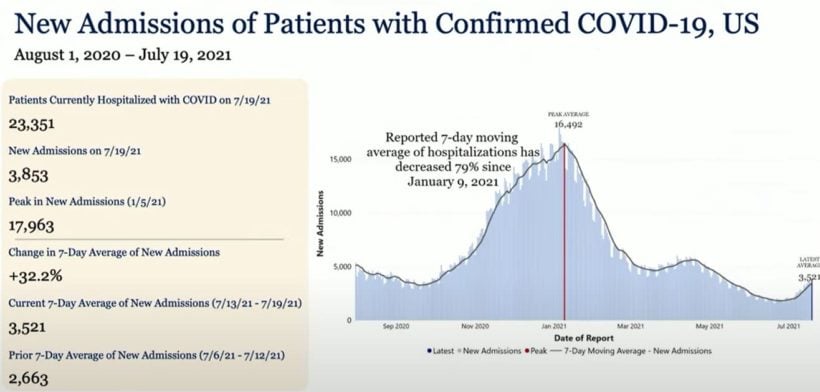
The delta COVID variant is one of the most infectious respiratory diseases ever seen by scientists, the director of the Centers for Disease Control and Prevention said Thursday.
The variant is highly contagious, largely because people infected with the delta strain can carry up to 1,000 times more virus in their nasal passages than those infected with the original strain, according to new data.
“The delta variant is more aggressive and much more transmissible than previously circulating strains,” CDC Director Dr. Rochelle Walensky told reporters at a briefing Thursday. “It is one of the most infectious respiratory viruses we know of, and that I have seen in my 20-year career.”
Read more: What you need to know about the coronavirus right now
The delta variant has spread quickly through the U.S., accounting for more than 83% of sequenced cases in the U.S. right now, up from 50% the week of July 3.
The seven-day average of new cases is up about 53% from last week, currently at 37,674 new cases per day. Hospitalizations are up 32% from last week at about 3,500 per day and deaths have also increased 19% in the same time frame to about 240 per day.

Centers for Disease Control and Prevention
“This virus has no incentive to let up, and it remains in search of the next vulnerable person to infect,” Walensky said.
The virus is ripping through U.S. counties with low vaccination rates, while counties with high vaccination rates are seeing lower rates of new cases.
Three states, Florida, Texas and Missouri, with low vaccination rates accounted for 40% of all new cases nationwide, White House COVID czar Jeff Zients said. Florida alone accounted for 1 in 5 of all new cases in the U.S. for the second week in a row.
Read more: Most fully vaccinated people who get COVID delta infections are asymptomatic, WHO says
In hospitals around the country, 97% of people admitted with COVID symptoms are unvaccinated, and 99.5% of all COVID deaths are also among the unvaccinated.
In the past week, the five states with the highest case counts had higher rates of people getting newly vaccinated compared with the national average.
“We are at yet another pivotal moment in this pandemic, with cases rising again and some hospitals reaching their capacity in some areas, we need to come together as one nation,” Walensky said.

